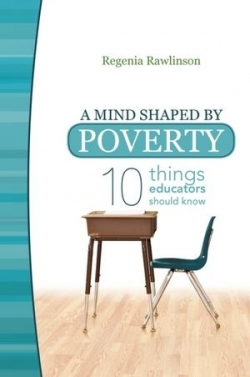A Mind Shaped By Poverty
Ten Things Educators Should Know
- 2011 INDIES Winner
- Gold, Education (Adult Nonfiction)
Regenia Rawlinson, an educator, counselor, and school administrator for more than thirty years, wrote A Mind Shaped By Poverty to help teachers and administrators understand the ubiquity of obstacles encountered by poverty-stricken youth in our schools. She shares the profound insights and wisdom she gained while growing up in dire poverty and brilliantly commingles her own experiences with solid research, telling anecdotes, and hard truths. Rawlinson’s premise—that most educators are unaware of poverty’s impact on the minds of young people—rings indisputably true.
Each of the book’s fourteen chapters is rich with tangible information that teachers and others who work closely with children can immediately use to transform their relationships with struggling students. The brevity of A Mind Shaped By Poverty in no way detracts from its outstanding qualities. In fact, Rawlinson has created a seminal primer that flawlessly consolidates meaningful, applicable material for busy educators who will feel compelled to return to the text time and again. The author’s cut-to-the-bone approach avoids platitudes and redundancies. She succinctly summarizes what educators need to do to help poverty-challenged students succeed.
Each of the first ten chapters, with titles such as “Fairness,” “Protest,” “Escape from Stress,” and “Discretionary Learning,” begins with a deeply instructive story from the author’s childhood as one of seventeen siblings raised by sharecroppers. For example, in the chapter titled “Access,” she writes, “My life was full of fighting and contention. I thought I had to fight for everything. When I started school, I carried that mindset with me.” In the same chapter, she argues, “Students living in poverty are often tagged as troublesome, dishonest, dumb, and lazy. They have to prove their innocence and ability before they get access to some educational opportunities.”
The final three chapters provide checklists of important points to remember about the book’s ten themes. In her conclusion, Rawlinson leaves readers with several inspiring, from-the-heart thoughts.
Anyone who works with disadvantaged youth will benefit from reading A Mind Shaped By Poverty. It truly stands out from the crowd of similarly themed books on nearly every level.
Reviewed by
Patty Sutherland
Disclosure: This article is not an endorsement, but a review. The publisher of this book provided free copies of the book and paid a small fee to have their book reviewed by a professional reviewer. Foreword Reviews and Clarion Reviews make no guarantee that the publisher will receive a positive review. Foreword Magazine, Inc. is disclosing this in accordance with the Federal Trade Commission’s 16 CFR, Part 255.

